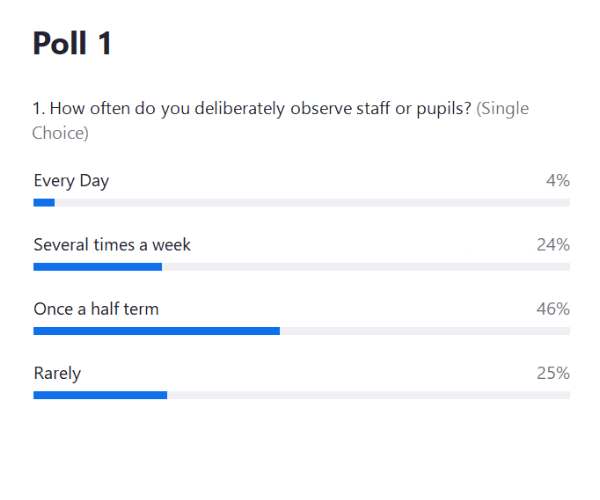SEND: Improving High Quality Teaching: Lesson Observation Tips for SENDCOs
_1000.png)
This blog is based on Judicium’s SEND Service ‘Sofa Session’ from the 8th of February, with our resident expert Rik Chilvers. This session focused on what are Ofsted looking for when they observe teachers, how you can link your observations into other school priorities and best practice tips for ensuring your feedback motivates your teams.
Why and what to observe?
Observations broadly have two goals: to develop our understanding of the strengths and needs of a child and to better understand how we can support the staff that work with them to provide high quality education.
Regular observations of both a child and the staff who work with them provide important context to other sources of information SENDCOs use (such as data). This holistic understanding enables SENDCOs to work with stakeholders to effectively plan, deliver and review the provision for a child and ensure they are working towards their targets.
Observations are also central to monitoring the teaching happening throughout your school. They enable leaders to tailor the CPD they offer to ensure staff have the necessary skills and knowledge to meet the needs of students.
Poll 1
What are Ofsted looking for when they observe teachers?
Under the current Ofsted inspection framework, "lesson visits are not about evaluating individual teachers or their teaching" and "teaching will not be graded" (School Inspection Handbook).
Instead, they're used by inspectors to triangulate other findings related to your school's quality of education. To this end, they will not randomly visit lessons, but choose specific ones that connect to other evidence they have gathered.
This means that inspectors will be looking at:- How the lesson fits into an ambitious curriculum that is "coherently sequenced to meet all pupils' needs."
- Whether children's work demonstrates this careful sequencing and incremental progress.
- How teaching and learning is adapted to meet the needs of children with SEND.
- Whether children understand how teachers help them to learn.
- How behaviour is managed within individual classrooms and how pupils respond.
Provision for children with SEND will be a topic of conversation when Ofsted meet your teachers, so your observations and feedback can help prepare them (and you) for this.
Specifically, inspectors will talk to staff about:- How the school’s curriculum informs their choices about content and sequencing to support pupils’ learning.
- How they adapt their teaching and learning to meet the needs of children with SEND (including how they deploy teaching assistants for maximum effect).
Top Tip: To help you prepare for your next Ofsted inspection, consider the areas of SEND inspectors might be most interested in. For example, if you have a high number of children with a particular need or you know that a cohort of children with shared need are underperforming, consider delivering some training revisiting the ways you see staff adapting their lessons for that cohort. The goal is not to cover anything new, but to highlight teaching and learning strategies you’re already using and signpost to Ofsted. NB: Remember that inspectors will meet with staff without leaders present.
How can you link your observations into other school priorities?
It's important to remember that the goal of observations, whether of lessons or of unstructured times, is to improve the outcomes of students. One way that you can achieve this is to align your observations with other strategic school priorities.
For example, if improving literacy is one of your school's development targets, you may wish to consider making this a focus of some of your observations.
Practically, that might involve you considering the adaptations teachers are making to writing tasks:- how complex tasks are broken down into stages.
- considering whether children have access to vocabulary banks with words from appropriate tiers and reviewing how effective these tools are at removing barriers to learning.
This will enable you to provide the SLT with insight into the successes and challenges of delivering this school priority to your cohort of children with SEND.
One of the areas Ofsted will discuss with staff is how the training and support they receive helps them to deliver [curriculum] content effectively.
This links with the SEND Code of Practice which explains how the quality of teaching for pupils with SEN, and the progress made by pupils, should be a core part of the school’s performance management arrangements.
Whether or not you are a senior leader, it's important that you inform SLT of the areas you identify through your observations for development within teaching and learning and curriculum design.
This doesn't mean that SENDCOs should be taking responsibility for these areas, but that best practice is for them to conduct joint observations with the respective leads.
Teachers have reported being more strongly committed to school priorities when leadership responsibilities are distributed. SENDCOs can capitalise on this by working with subject leads to conduct some observations aimed at informing curriculum planning and letting their teams know that future observations by these colleagues will also have that in mind.
Telegraphing the focus of your observations across a term, e.g., use of physical resources to remove barriers to learning, gives staff something to work towards and makes summarising your findings to SLT or the wider staff at the end of the period much easier.
Best practice tips for motivating feedback
Feedback is most effective when it is received as developmental rather than judgemental. The tipping point between these can be influenced by how regularly you conduct observations: frequent observations can help make them become more developmental as the stakes are lower and enables your targets to be SMART.
Top Tip: Frequent observations can help make them become more developmental as the stakes are lower. frequent observations also enables you to provide
Top Tip: Make your observation feedback descriptive. For example:
"When I entered the classroom, the students were doing X. Child A was off-task because Y. You used Z strategy which was effective and they were able to re-engage for the rest of the activity."
Keeping your feedback descriptive encourages the targets you set to be SMART. If you can, prioritise meeting with the colleague you observed on the same day to talk through your notes and any targets.
Using different models of observation to best effect
Each school will have its own expectations for day-to-day lesson observations of teaching staff. However, what about observations of children?
Specific, detailed observations of a child demonstrating their needs can be pivotal in securing an EHCP.
Time Sample
It’s a simple observation that can help you measure the effectiveness of interventions. In a time sample observation, the observer records the time and duration of a certain behaviour across a day. These can be useful as pre- and post-intervention assessments as well as a way of helping you identify patterns in a behaviour (e.g., it mainly occurs after a transition).
Spidergraph
For colleagues in the early years, spidergraphs can be particularly helpful in understanding activities a child feels particularly confident in, and vice versa. Before the observation, draw a map of the classroom and the activities available. Over a fixed period (e.g., 10 minutes), track the child's movement. Areas they avoid might indicate they are avoiding using a certain skill or lack a piece of knowledge (e.g., fine motor skills).
Sociogram
Similarly, a sociogram can map a child's patterns of social interactions. These can be particularly helpful in observations of unstructured time. Sociograms develop your understanding of who a child prefers to interact with and under which conditions, which can help indicate the type of social skill support they require.
Antecedent - Behaviour - Consequence (ABC)
ABC observations, also called event sample observations, can be particularly helpful when trying to identify the triggers or purpose of behaviour.
ABC here stands for antecedent (what happened before the behaviour), behaviour (a description of what happened) and consequence (what happened afterwards). This kind of observation helps observers understand patterns of behaviour and identify strategies that might support the child.
Running record
A similarly useful observation is a running record. Similar to those used to track progress in reading, these observations record everything a child says over a period of time (e.g., up to 10 minutes). Such detailed information can help you to understand predictable behaviours (e.g., refusing to engage in certain tasks).
Remember that it doesn't have to be the SENDCO who conducts these observations. Training TAs and SEND Leads in departments and phases can be one of the best ways of distributing expertise and making SEND a whole-school issue.
Summary of top tips
- Use a range of different child observation methods to develop your understanding of their strengths and needs and use these to substantiate EHCP application.
- Be mindful of likely areas of focus for Ofsted and use your observations and feedback to track and develop relevant knowledge and skills.
- Work with your colleagues: Train TAs to conduct observations of children and conduct joint observations with heads of department or leads for teaching and learning and the curriculum.
- Consider conducting frequent low-stakes lesson observations around termly themes to effectively support your colleagues.
- Provide feedback to your SLT on findings from your observations so they can be incorporated into whole-school CPD planning.
Additional Info
If you require any SEND support in any of these steps or would like to talk to someone surrounding our SEND Support Service for your school, please do not hesitate to call us on 0345 548 7000 or email georgina.decosta@judicium.com
You can follow us on Twitter: @JudiciumSG @JudiciumEDU
If you’d like to review all of Judicium’s forthcoming sofa sessions please click here
© This content is the exclusive property of Judicium Education. The works are intended to provide an overview of the sofa session you attend and/or to be a learning aid to assist you and your school. However, any redistribution or reproduction of part or all of the contents in any form is prohibited. You may not, except with our express written permission, distribute or exploit the content. Failure to follow this guidance may result in Judicium either preventing you with access to our sessions and/or follow up content.
Related content
.png)
This blog is based on Judicium’s Safeguarding ‘Sofa Session’ from the 9th of July, with our resident expert Rik Chilvers
.png)
This blog explores how school leaders can develop SEND provision; when the right strategies are applied, leadership teams can build inclusive, confident, and impactful SEND provision that benefits every pupil.
.png)
This blog is based on Judicium’s SEND ‘Sofa Session’ from the 21st of May, with our resident expert Rik Chilvers.
.png)
This blog is based on Judicium’s SEND ‘Sofa Session’ from the 26th of March, with our resident expert Rik Chilvers.

This blog is based on Judicium’s SEND ‘Sofa Session’ from the 11th of December, with our resident expert Rik Chilvers.

As the pressure on schools increases, we need to examine the current challenges and reflect on actions that ensure every child, regardless of their strengths and needs, has access to the education they deserve. The impact this is having on the whole school community is already apparent, but how do schools and academy trusts even begin to address this?


Sofa Sessions | SEND